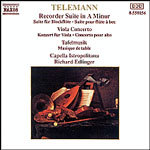
Telemann: Viola Concerto / Recorder Suite in A minor / Tafelmusik
 $25.00
Out of Stock
$25.00
Out of Stock6+ weeks add to cart
GEORG PHILIPP TELEMANN
Telemann: Viola Concerto / Recorder Suite in A minor / Tafelmusik
Capella Istropolitana / Richard Edlinger (conductor)
[ Naxos / CD ]
Release Date: Monday 26 July 2004
This item is currently out of stock. It may take 6 or more weeks to obtain from when you place your order as this is a specialist product.
"...you will be hard pressed to match this quality and repertoire on a single disc - or the price. Don't pass this one up."
- American Record Guide
"It is difficult to conceive of a better Telemann programme."
- Penguin Guide
"...played with an admirably spontaneous sense of style."
- Gramophone
"...an attractive introduction to Telemann and his music."
- Fanfare
"...you will be hard pressed to match this quality and repertoire on a single disc - or the price. Don't pass this one up."
- American Record Guide
Georg Philipp Telemann was among the most distinguished composers of his time, a rival to his friend Johann Sebastian Bach in reputation, and the certain preference of the Leipzig authorities for the position of Kantor at the school of St, Thomas, where Bach was eventually appointed in 1723. Telemann had, in 1721, taken the position of Kantor of the Johanneum in Hamburg, with musical responsibility for the five principal churches of the city. His negotiations with Leipzig a year later proved the means to secure better conditions in Hamburg, where he remained until his death in 1767. He was succeeded by his godson, Carl Philipp Emanuel Bach, son of Johann Sebastian.
Born in Magdeburg in 1781, Telemann belonged to a family that had long been connected with the Lutheran Church. His father was a clergyman and his mother the daughter of a clergyman, and his elder brother also took orders, a path that he too might have followed, had it not been for his exceptional musical ability. As a child he showed some precocity, but it was while he was a student at Leipzig University, which he entered in 1701, that a career in music became inevitable. He founded the university collegium musicum that Bach was later to direct and in 1703 became musical director of the Leipzig Opera. At the same time he involved fellow-students in a great deal of public performance, to the annoyance of the Thomaskantor, Bach's immediate predecessor Kuhnau, who saw his prerogative now infringed.
After Leipzig Telemann went on to become Kapellmeister to the Count of Promnitz, a nobleman with a taste for French music, and in 1708 moved to Eisenach, following this with a position as director of music to the city of Frankfurt am Main in 1712. There were other offers of employment elsewhere, but it was to Hamburg that he finally moved in 1721, to remain there for the rest of his life.
As a composer Telemann was prolific, providing an enormous body of work, both sacred and secular. This included 1043 church cantatas and settings of the Passion for each year that he was in Hamburg, 46 in all. In Leipzig he had written operas, and he continued to involve himself in public performances in Hamburg, arousing some opposition from the city council, his employers. Once he had strengthened his position he took additional responsibility as musical director of the Hamburg opera, while he was active in publishing and selling much of the music that he wrote.
Tracks:
Concerto in G major for viola and strings
Suite in A minor for recorder and strings
Concerto in F major for three violins (from Musique de table)
Concerto for two horns and strings (from Musique de table)
